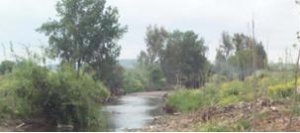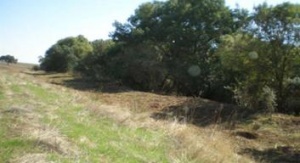Olivenza. Hydrological and Forestry Restoration of the Olivenza riverside.
Olivenza. Hydrological and Forestry Restoration of the Olivenza riverside.
Key features of the case study
- Proximity of croplands.
- Demand of flood protection from the farmers.
- Proximity of the SCI ES4310027 'international Guadiana River. "
- Proximity of croplands.
Site description
The Olivenza river is tributary to the Guadiana river. The area of actuation is not included in the Natura 2000 network but includes a riparian forest consisting of ash tree like the main species. The environmental value of the riparian forest may be considered for its funtion os corridor and buffer.
Measures selection
This should not figure here as a an ecological and hidromorphological restoration project. In fact, the project was design for flood protection, pursued by the construction of levees and weirs.
Some of the measures can improve the structure and composition of the riparian vegetation: silvicultural treatments (clearing, pruning), elimination of invasive species and plantation of native species.
To improve the hydraulic capacity of the river, as a way to prevent floodings, the woody debris have been removed from the channel, what can be considered an innapropiate measure, but understood if we consider the social context and the point of view of the farmers who cultivate at the floodplain. Also, 4.900 m3 of sediments were removed from the river channel.
The engineering measures considered for flood protection include transversal hydrological correction works, with the construction of five weirs (0,6 m height) and longitudinal spots over 550 m.
Success criteria
Ecological response
Hydromorphological response
Monitoring before and after implementation of the project
Socio-economic aspects
Contact person within the organization
Extra background information
The General Department of Biodiversity of the Ministry of Environment made a report the 11th July of 2005 where one observation declaring that the implementation of the project would increase the artificiality of the flow regime, affecting, at the end, on the Guadiana river, where are located habitats of community interest(Pyro pastures bourgaeanae-Quercetum rotumdifoleae and Salicetum salvifoliolambertinae).
The mitigation measures proposed by the General Department of Biodiversity were accepted by the project promoter, reducing the potential impact over these habitats.
References
Resolution of April 27th, 2006, the General Secretariat for the Pollution and Climate Change Prevention, adopting the decision to waive the Environmental Impact Assessment of the Project "Hydrological Restoration of Olivenza riverside 2nd Stage (Badajoz)", promoted by the Guadiana Hydrographic Confederation. [1]

